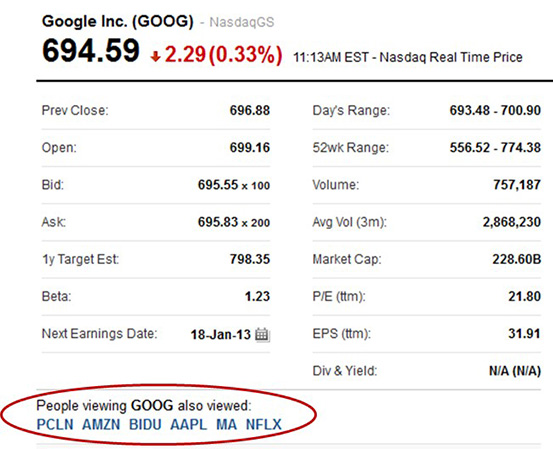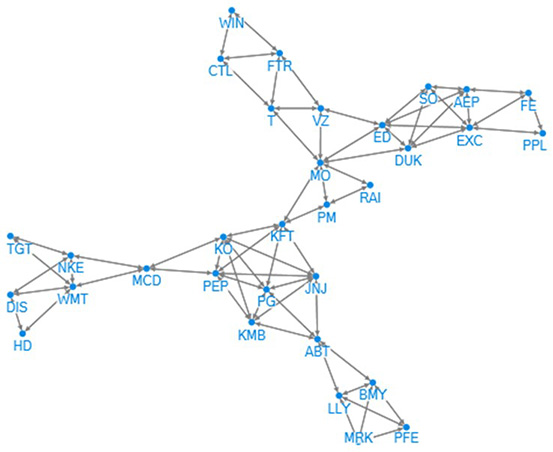The use of online platforms is now ubiquitous – and generating a wealth of valuable data. Dr Alvin Leung Chung-man, Assistant Professor in the Department of Information Systems, investigates how financial technologies (FinTech) can be used to analyse the digital footprint of online users, uncovering aggregate customer preferences, and revealing investment opportunities.
The primary research data in this study come from Yahoo! Finance. This is a great resource and consistently ranks number one in online finance communities in the US. Making use of cookies, Yahoo! records aggregate user search data and presents a summary of top co-search activities on a stock summary page. Figure 1 presents a snapshot of the summary, and shows that people who search Google are also interested in Priceline (PCLN), Amazon (AMZN), Baidu (BIDU), Apple (AAPL), MasterCard (MA) and Netflix (NFLX). The data is dynamic and changes over time. Our study aggregates the dynamic changes of the co-search data of Russell 3,000 component stocks over four years (see Figure 2).
Example of aggregate search information of Google
Search clusters
Using network analysis approach, we identify 50 to 79 dynamic search clusters that represent common interests of investors.
The search clusters shown in figure 3 demonstrate characteristics of investment habitats that have been documented in previous finance research based on transactional data, for example, returns co-movement (stock price tends to move in the same direction in the same habitat with control of market factors). The research results show that a cluster is not necessarily formed simply by industry and other accounting fundamentals such as firm size or market-to-book ratio.
A number of other reasons may influence investors' stock preferences, such as firm location, supply-chain relationship, or volatility, to name but a few. For example, Walmart may be frequently searched with Nike, Disney, and Home Depot. Aggregate search data may reveal the unique preferences of investors which may not be easily discovered using traditional finance theories.
Co-search networks of Russell 3000 stocks in September 2011
Arbitrage opportunities
The aggregate search data open up new avenues for research and investment opportunities. As some firms such as supply-chain partners are economically related to each other, the performance of partners is highly correlated. For example, strong sales of Hewlett-Packard (HP) PCs may positively affect the future performance of Intel, as HP is one of Intel's major customers. If the majority of investors are aware of the supply-chain relationship, the stock price of Intel should immediately be reflected if a sales announcement of HP is released. However, given that there are plenty of supply-chain partners, and investors have limited cognitive processing power, they may not always be aware of supply-chain partner news. In this case there is a delayed market reaction. This opens up an arbitrage opportunity.
We have identified supply-chain partners of all Russell 3,000 firms using Bloomberg, and find that the aggregate search intensity on Yahoo! Finance can be a proxy of co-attention of investors to supply-chain related stocks. Formulating a portfolio that trades inattentive supply-chain partners with the highest extreme lagged stock returns, we find that it is possible to generate a portfolio with an annualised alpha of 20.77%.
The "also-search" feature of Yahoo! Finance was suspended in May 2015, and this investment opportunity may be privatised. Nevertheless, there are still abundant search data available on other financial portals, for example, Nasdaq.com. Also, aggregate search information is not just limited to financial portals but is also available through e-commerce sites such as Amazon and Taobao. This sort of information may help to forecast customers' demand for consumer goods and related products.
- Leung, A.C.M., Agarwal, A., Konana, P., & Kumar, A. (Forthcoming).Network Analysis of Search Dynamics: The Case of Stock Habitats.Management Science. http://dx.doi.org/10.1287/mnsc.2016.2470
-
Leung, A.C.M., Agarwal, A., Konana, P., & Kumar, A. (Forthcoming).Co-search Attention and Stock Return Predictability in Supply-Chains. Information Systems Research.




